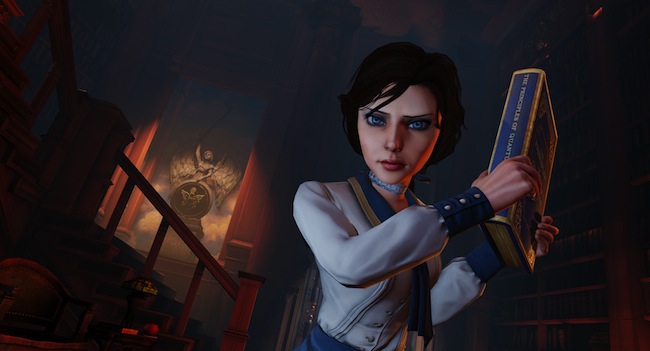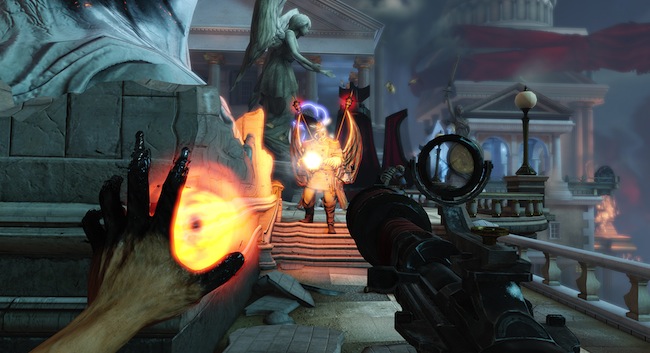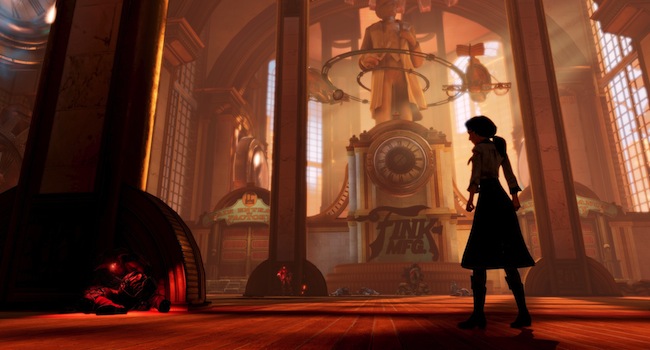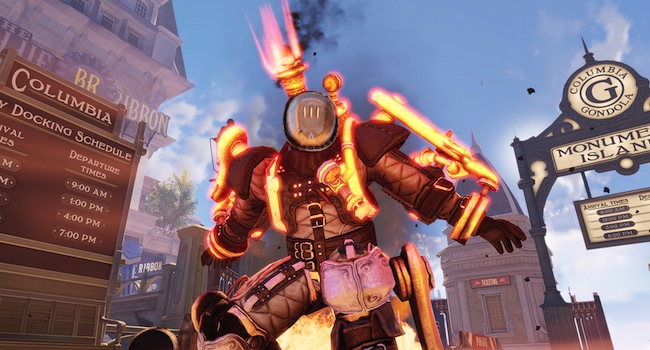MTN South Africa has once again emerged as the country’s top-performing mobile network, securing the highest score in the Q2 2025 MyBroadband Network Quality…
BioShock Infinite review: the sky’s the limit

As BioShock Infinite came to an end and the screen faded to black, I blinked in stunned silence, wiped the drool from the corners of my mouth and, quite literally, checked to see if my jaw was still in place. This is a spoiler-free review, so enjoy.
You enter this strange world knowing that it will all end eventually, somehow. But not like this. The manner in which Infinite closes is reminiscent of an operatic symphony complete with visual delights and aural pleasures that probe your grey matter and delight your senses. Your eyes and ears will be mesmerised by the final, grand reveal, but similarly by the twelve preceding hours of story that have been spooned out to you like servings from a delicious chocolate dish. And Infinite’s final moments are just as they should be: bold, affecting and clever, a fitting denouement to a game that leaves you in no doubt that Ken Levine and his team are the best storytellers in the business.
Above the ocean
Once again Irrational Games has dreamed a world that begs to be explored. Columbia is a grand city that floats above the clouds; a safe-haven for believers. As you move through Columbia you’ll find yourself peering at the vast expanse of sky below you. You forget, for a brief instant, that this is a completely fictional world. Instead you marvel at the ingenuity underpinning its design. And as you piece together a picture of just how Columbia sustains itself, you get the sense it’s comprised of a series of disparate vessels seemingly strung together and kept afloat by hot air balloons and technical cunning alone. Eventually there is an explanation for how it all works, but by that point you’ve made up your own version, and it need no longer abide by the laws of logic.
On the ground, Columbia is a classic utopia that brims with idealism and nationalist fervour, but look beyond the manicured lawns and prim populous and you realize something is amiss. Unlike Rapture, which hinted at a rosy past you never got to see, you arrive at Columbia while it’s in in the throes of prosperity: the effect this has is more pronounced, because it’s disquieting to know that, below the plumage, there’s a seedy underbelly lying in wait.
Riddle me this
Much of the pre-release chatter furiously labelled Infinite as a thinly veiled attack on organised religion. But having played the game, it’s clear to me that the actual narrative concerns itself with a great deal more than simply religion (and I mean that in the least blasphemous way possible). Indeed, it explores complex philosophical theory and elements of quantum mechanics and you won’t need a degree from MIT to get to grips with it. No. Irrational takes you by the hand and gently unfurls the story to you.

Take the way it begins. You’re in the shoes of Booker DeWitt, a gruff type who can handle a gun. You first join him as he is being rowed towards a lighthouse by a mysterious man and woman. The lighthouse is a knowing and clever nod to BioShock 1 (Infinite is not a direct sequel but a game within the same universe) but it’s not the lighthouse that proves intriguing. No, it’s a note stamped to the door of the lighthouse that will resonate with you: “Bring us the girl and wipe away debt.” This delicious opening gambit propels you into the game itself. Who is the girl? And what is the debt? The first question has an answer early on. The girl is Elizabeth, a Rapunzel figure imprisoned in a tower styled in her own image. As for the debt? Well, you’ll have to play to find out.
Still, it’s not a spoiler to say that you and Elizabeth eventually join forces. Booker might have a voice and a backstory but he’s really just a lens into Elizabeth’s life. As Levine himself has said, this is not Booker’s story, but Elizabeth’s. And it’s a tale you’re privileged to observe, the first-person view central to your role as spectator-in-chief.
The problem is, of course, that Irrational is intent on telling a story and telling it as a first-person shooter. You control the gun, fine, but the game’s AI needs to control Elizabeth, the central character in the plot. In lesser hands the whole affair would be an exercise in shepherding her from one room to the next, but Irrational handles Elizabeth with dexterity. She’s not only helpful, better yet, she’s unobtrusive and you’ll be able to count the number of times she bumps into you on one hand. Elizabeth is also hugely likeable, and you build up a rapport as the game goes along. At times she seems like an inelegant way of servicing the needs of the story, but she’s also such an integral part of the game that, by the end, you can’t imagine what it’d be like without her.
Tropes in different frock
Still, don’t be fooled into thinking the highfalutin story makes Infinite a cleverer game than any other, at least mechanically. The story might explore interesting themes, but this is still a first-person shooter, a fact Levine and co. have been keen to gloss over. So yes, you still spend much of the game blasting people with your shotgun, and watching smoke billow from the butt of said shotgun while a man screams in agony; a man sporting meaty stumps for legs.
There are other tropes too. Booker has access to supernatural powers called Vigors (Plasmids in all but name) that gives him the ability to turn people into chop suey, as well as a host of other ridiculous talents. I like gratuitous interactive violence as much as the next person, and every game needs a skill component or else they’re just an interactive film, but I am irked by the notion that Infinite somehow revolutionizes the way we play first-person shooters. In actual fact it feels a lot like BioShock 1 before it. The world is beautiful, the story is mesmerising, but the mechanics that underpin the game are nothing inherently new.
In fact there’s no escaping the truth that Irrational is better at building worlds than giving you a gun. The action looks colourful and kinetic but there’s something missing. Irrational still gives me the impression that it secretly wants to make an RPG but is pandering to gung-ho expectations. There are all these half-hearted nods to role-playing games of old, like the million incidental items you find by rummaging through bookshelves and cupboards. It gives you something to do when you’re not in battle, sure, but if you’re like me you’ll struggle to resist the urge to loot bodies in the midst of oncoming gunfire. Infinite is as much a game about quantum theory as it is about stealing from people.
Hooks in the sky
As a playground, Columbia boasts bigger environments than its forebear. Apparently “linear” is a dirty term in the industry at the moment and Irrational has taken note. As a result, while the hallways of Rapture were cramped and stiflingly oppressive, Columbia gives you space to move. During several key fights you’ll come across the “sky-line”, which Booker can attach to by using his “sky-hook”. Think of it like riding a roller-coaster ride while hanging from a mechanical claw. Yeah. Strangely, however, it makes sense within the world. After all, if you were a member of the five-oh living in a world suspended above the clouds you’d need a way of circumnavigating pesky gravity.
The sensation of using the sky-lines reminds me of the ability to “warp” in Dishonored, except the idea here is much more novel. On the other hand, the sky-hook feels less like a useful tool in a crisis, and more a novelty that makes the world around you more interesting. It also promotes an illusion of freedom, but this illusion is tenuous: the sky-hook certainly doesn’t allow you to reach far-flung corners of different levels and Infinite is not the sandbox game I once inwardly imagined it to be. Then again, I prefer the real version. Irrational has a story to tell and they masterfully give you the sense of freedom while still tethering you to the world.

Less interesting is Elizabeth’s “power”, a trick you can instruct her to use on the battlefield. At the risk of spoiling an important plot-point, I won’t go into detail; all you need to know is that her “talent” engenders another option in the heat of battle which again, promotes the illusion of choice. But you’ll mostly be too busy hammering triggers to care, and while the option of using Elizabeth’s special ability fits the story, it feels contrived as a game-play mechanic.
Big, bold and beautiful
So: the shooting bits have been done better elsewhere. And, towards the end, Infinite seems to be a little too wrapped up in the idea of mass-slaughter. Who cares? The best things in life are flawed and it’s easy to nitpick a game of BioShock’s scale. In the end, Infinite is a fitting title for a game that will mean so much, and so many different things, to so many millions of people. Play the game in its entirety and you’re sure to leave with a lasting impression of Columbia. Never before will you have explored a world so rich, so deep, so laden with backstory. The sights are so diverse, the details so intricate, your brain will struggle to take it all in the first time of asking.

In fact, after that screen fades to black and the credits roll, you’ll very likely go back and start it all again. This is a story where every seemingly insignificant line of dialogue later mushrooms into an important strand of the plot. All the clues are there. And much like a good Christopher Nolan film, you’ll take delight in going back and connecting all the dots.
Verdict: Irrational tells a big, rousing story and by the end of it, you’ll be left in wonderment. It’s told so deliciously, so cleverly, you’ll glibly follow its every fork and turn. It might not be the best game to give you a gun, and yes, there some fights that feel tiresome, but Infinite is shining example of the creative souls that work in this industry. Ken Levine: what a beautiful mind. Play this at all cost.
Score: 9/10

